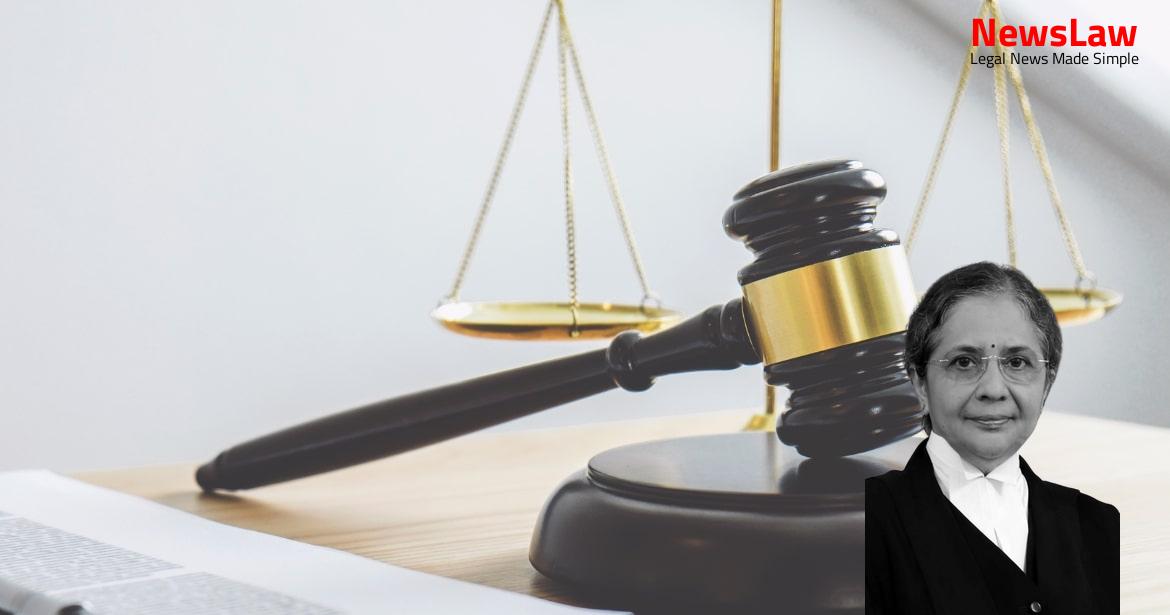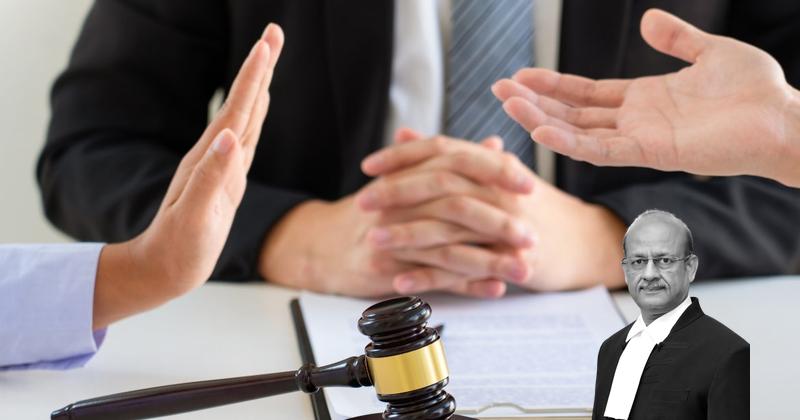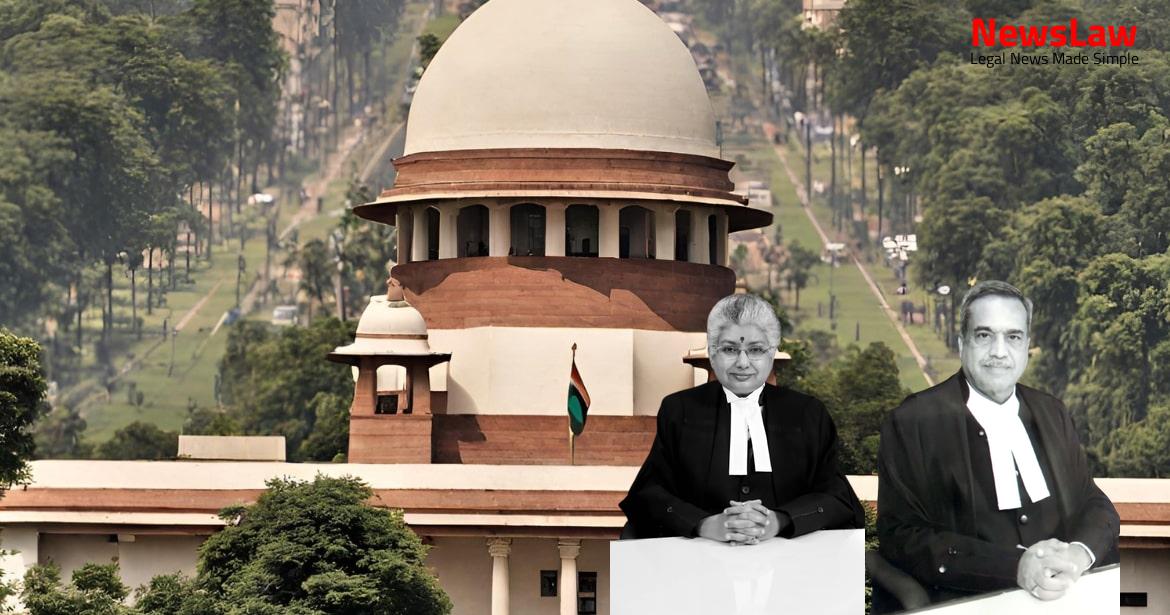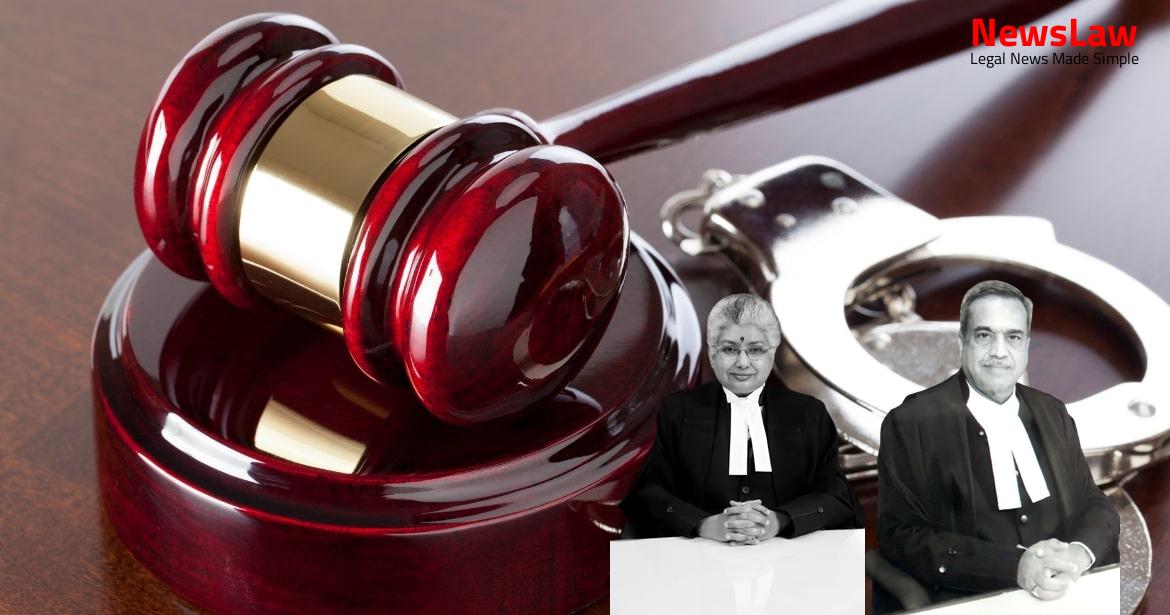Said writ petition had prayed, inter alia, for following reliefs: – (A) “Issue appropriate writs, orders or directions directing the Respondents to produce mercy files pertaining to the Petitioner, all the relevant papers and correspondence pertaining to the Petitioner’s 2 mercy petition, for the perusal of the Court since the Petitioner has been able to show a grave, and unexceptionable delay in such processes as undertaken by the Respondents.
Also Read: https://newslaw.in/case-type/civil/courts-analysis-on-compliance-with-resolution-plan-conditions/
(D) Issue appropriate writs, orders or directions commuting the death sentence of the Petitioner to imprisonment for life. The appellant was arrested in connection with said crime on 2.3.1998 and has been in custody since then. The matter was heard by a Bench of two Judges, which confirmed the order of conviction, but disagreed on the sentence to be imposed. 285-286/2011 before this Court, which were dismissed by this Court vide order dated 1.2.2011, affirming the appellant’s conviction and sentence of death imposed upon him. Provided that in cases where no appeal to the Supreme Court, has been preferred or no application for special leave to appeal to the Supreme Court has been lodged, the said period of seven days shall be computed from the date next after the date on which the period allowed for an appeal to the Supreme Court or for lodging an application for special leave to appeal to the Supreme Court expires. Around the same time, Writ Petition (Crl.) No 6 52/2011 was preferred by the appellant in this Court praying, inter alia, for the relief of open Court hearing in review petition. 7 (j) Consequently, the Review Petition which was rejected earlier on 7.9.2011, was listed for re-hearing before a Bench of three Judges of this Court, which by its order dated 3.10.2016, dismissed the Review Petition and affirmed the award of death sentence.
After considering the submissions advanced on behalf of the parties, the following conclusions were arrived at by the High Court: – “(i) There is no excessive, unexplained, inordinate delay attributable to the respondents in deciding the mercy petition; (ii) There is no violation of the petitioner’s right under Article 21 of the Constitution of India; (iii) All the relevant and crucial materials required for deciding the mercy petition were placed before His Excellency, the Governor and His Excellency, the President of India and nothing has been kept out of consideration; (iv) Petitioner cannot be said to have been kept in solitary confinement.” In the challenge raised in the instant matter, while issuing notice, the order dated 31.1.2022 passed by this Court noted the submissions on behalf of the appellants as under: – “a) Even after recording a finding that there was avoidable delay to the extent of 550 days in disposing of the mercy petition, the High Court did not grant any relief to the petitioner.
Since the National Institute of Mental Health and Neuro Sciences (NIMHANS) at Bengaluru, has on the earlier occasion made psychological assessment of the petitioner, the Director NIMHANS is directed to constitute a suitable team for psychological evaluation of the petitioner and send a Report before the next date of hearing. The Jail Authorities, Belgaum Central Prison where the petitioner is presently lodged shall render complete co- operation in facilitating access to and due evaluation of the petitioner in all respects.” When the matter was taken up on 21.4.2022, after noting the submission advanced on behalf of the appellant that the appellant had been kept in solitary confinement right from the decision of the Sessions Court, directions were issued to the District Judge, 10 Belgaum to cause an inspection to be undertaken and submit a report. Nikhil Goel, learned AAG for the State, on instructions, submits that video conferencing can be arranged so that this Court can have clear knowledge about the circumstances in which the petitioner has been lodged in a Cell. It is made clear that the Cells which are close to the gallows and are used for keeping persons about to be executed, are different from the Cells for the Death Row Convicts.
The Registry is directed to make copies of the file and return the same to the concerned advocate on record by tomorrow.” Accordingly, report dated 21.4.2022 has been placed on record by Principal District & Sessions Judge, Belgaum alongwith picture photograph(s) of the concerned Jail barracks and the cells. In one of the cells, there are four persons involved in an offence of kidnapping, robbery, and murder. The Remaining two cells are occupied by one person each i.e, Akash Desai convicted for offence under NDPS Act for 10 years. The inmates of the cell informed that they are unlocked from the cells at about 6.00 a.m. It was also informed that prisoners are at liberty to purchase bakery items which are prepared by the inmates 13 and sold in the prison itself.
The photographs and videos of the cells are attached with this report for kind perusal.” On the subsequent date, the submissions advanced on behalf of the appellant were discussed in the order dated 26.4.2022 as under: – “ The Principal District and Sessions Judge, Belagavi has placed on record his Report dated 21.04.2022. Chaudhry further submits that after October, 2016 till January, 2019 the petitioner was lodged in same “Andheri Block” but was allowed to come out of the Cell thrice a day and after January, 2019 he was shifted to the present Barrack with respect to which the Report has been made. It is however, stated that all the inmates are allowed to come out of their cells thrice a day for the duration of 2-3 hours each.
3.11 The Central Government forwards the mercy petition to the State Government asking the Governor to consider the mercy petition first. 6.12
The mercy petition is rejected by the Governor 2 months and 25 days (85 days ) delay to forward the mercy petition to the Central Government. Time Period Relevant to the Mercy Petition Adjudication Total Custody suffered till Date 2.3.1998-23.2.2021 22 years, 11 months, 22 days (8,395 days)
Also Read: https://newslaw.in/supreme-court/recall-of-order-and-legal-analysis-on-resolution-plan-requirements/
Total Custody suffered under Sentence of Death 27.10.2006-23.2.2021 14 years, 3 months, 28 days (5,234 days) Total Delay caused in Disposal of Mercy Petition by State Govt. In its reply dated 9.1.2017 before the Hon’ble High Court (SLP Pg 316-325) and before this Hon‘ble Court the Respondent has merely stated that the Petitioner was allowed visits to the library and canteen and allowed visitors from time to time and hence his incarceration did not constitute solitary confinement. That neither before the High Court nor in its affidavit in reply before this Hon’ble Court did the Respondent aver that the Petitioner was allowed to mingle with other prisoners between 2006-2016.
Further, it is also established that there can be no absolute or unqualified rule laid down for the purposes of determining delay in mercy petitions and several factors are required to be taken into account while considering the question as to whether the death sentence should be vacated or not [See, Para 19 of Sher Singh & Ors. It is submitted that the delay, if any, on part of the Respondent No 1 has to be calculated from 26.12.2012 [when the required information was sent to the Central Govt.] till 12.05.2013 [when the mercy petition was finally 19 rejected]. This step of seeking a judicial review of the rejection of the mercy petition was only taken after the Review Petition was finally rejected by the Hon’ble Supreme Court after granting a hearing in Open Court. RE: RELEVANT RECORDS NOT BROUGHT TO THE NOTICE OF THE HON’ BLE PRESIDENT
It is submitted that the relevant documents were duly considered by the Hon’ble President before rejecting the Mercy Petition of the Petitioner. In response to the said letter, the required documents/information was sent by the Respondent No 2 vide letter dated 26.12.2012, including medical report of the Petitioner dated 05.10.2012 [Letter dated 26.12.2012 at page 19 of the Additional Documents filed by the Petitioner].” We now consider the first submission regarding delay in execution of death sentence due to pendency of Mercy Petition(s). In the United States of America where the right to a speedy trial is a constitutionally guaranteed right, the denial of a speedy trial has been held to entitle an accused person to the dismissal of the indictment or the vacation of the sentence (vide 21 Strunk v. Making all reasonable allowance for the time necessary for appeal and consideration of reprieve, we think that delay exceeding two years in the execution of a sentence of death should be considered sufficient to entitle the person under sentence of death to invoke Article 21 and demand the quashing of the sentence of death. Relying on the observations in Vatheeswaran, delay in execution was projected as a ground in a petition under Article 32 of the Constitution of India. We must take this opportunity to impress upon the Government of India and the State Governments 22 that petitions filed under Articles 72 and 161 of the Constitution or under Sections 432 and 433 of the Criminal Procedure Code must be disposed of expeditiously. the only jurisdiction which could be sought to be exercised by a prisoner for infringement of his rights can be to challenge the subsequent events after the final judicial verdict is pronounced and it is because of this that on the ground of long or inordinate delay a condemned prisoner could approach this Court and that is what has consistently been held by this Court.
But it will not be open to this Court in exercise of jurisdiction under Article 32 to go behind or to examine the final verdict reached by a competent court convicting and sentencing the condemned prisoner and even while considering the circumstances in order to reach a conclusion as to whether the inordinate delay coupled with subsequent circumstances could be held to be sufficient for coming to a conclusion that execution of the sentence of death will not be just and proper. In view of the above, we hold that undue long delay in execution of sentence of death will entitle the condemned prisoner to approach this Court under Article 32. Accordingly, if there is undue, unexplained and inordinate delay in execution due to pendency of mercy petitions or the executive as well as the constitutional authorities have failed to take note 24 of/consider the relevant aspects, this Court is well within its powers under Article 32 to hear the grievance of the convict and commute the death sentence into life imprisonment on this ground alone however, only after satisfying that the delay was not caused at the instance of the accused himself.
Paras 44 and 48 of the decision of this Court in Shatrughan Chauhan which were quoted in Ajay Kumar Pal, had laid down that undue long delay in execution of death sentence would entitle the condemned prisoner to pray for commuting the death sentence to that of life imprisonment. It must be stated that soon after the receipt of the said mercy petition, the Ministry of Home Affairs, Government of India forwarded the mercy petition to the Principal Secretary, Home Department, Karnataka so that the Governor, Karnataka could consider the mercy petition first. Thus, the entire period beginning from 03.03.2011 to 15.05.2013 spanning over a period of 2 years and 3 months saw disposal of mercy petition at two different levels, one, by the Hon’ble Governor and other by the Hon’ble President. In that case no decision was taken by the Hon’ble Governor in spite of the recommendations of the State Cabinet and as such the benefit of commutation was extended. According to the letter, the appellant was kept in solitary confinement since his admission to the prison in October, 2006 and that apart from common illness such as diarrhoea, fever, running nose and backache, the appellant was found to be suffering from psychosis with depression.
The said subject matter and processes have been explained in detail several times to the convict in the presence of all officers, but as the convict is mentally ill he is not agreeing to submit any more mercy petitions. –
No cell shall be used for solitary confinement unless it is furnished with the means of enabling the prisoner to communicate at any time with an officer of the prison, and every prisoner so confined in a cell for more than twenty-four hours, whether as a punishment or otherwise, shall be visited at least once a day by the Medical Officer or Medical Subordinate.” It must, therefore, be taken to be accepted that from 2006 till 2016, the appellant was kept in solitary confinement in “Andheri Block” and it was only thereafter, some relaxation in the rigours of 30 the solitary confinement was effected and as the record shows, from 2016 onwards the conditions were gradually relaxed. While dealing with Section 30(2) of the Prisons Act, 1894, which postulates segregation of a person “under sentence of death” Krishna Iyer, J. ( 5 ) The crucial holding under Section 30(2) is that a person is not ‘under sentence of death’, even if 31 the sessions court has sentenced him to death subject to confirmation by the High Court. Even if this Court has awarded capital sentence, Section 30 does not cover him so long as his petition for mercy to the Governor and/or to the President permitted by the Constitution, Code and Prison Rules, has not been disposed. The law laid down by this Court was not adhered to at all while confining the petitioner in solitary confinement right since the order of death sentence by the first court.
The writ petition thus stands allowed.” In its jurisdiction under Article 32 of the Constitution of India, this Court had thus deemed it proper to reach out and grant solace to the petitioner on both grounds, namely, delay in disposal of mercy petition and solitary confinement for a long period. In Shatrughan Chauhan, solitary confinement was accepted and recognised as one of the grounds on the basis of which death sentence can be commuted. The crucial holding under Section 30(2) is that a person is not “under sentence of death”, even if the Sessions Court has sentenced him to death subject to confirmation by the High Court.
State of Gujarat, this Court observed that keeping a prisoner in solitary confinement is contrary to the ruling in Sunil Batra and would amount to inflicting “additional and separate” punishment not authorised by law. Even though life imprisonment means imprisonment for entire life, convicts are often granted reprieve and/or remission of sentence after imprisonment of not less than 14 years. We, therefore, commute the death sentence imposed on the petitioner to life imprisonment, till his natural death, without reprieve or remission.” 35 27.
Case Title: B.A. UMESH Vs. THE UNION OF INDIA (2022 INSC 1173)
Case Number: Crl.A. No.-001892-001892 / 2022



